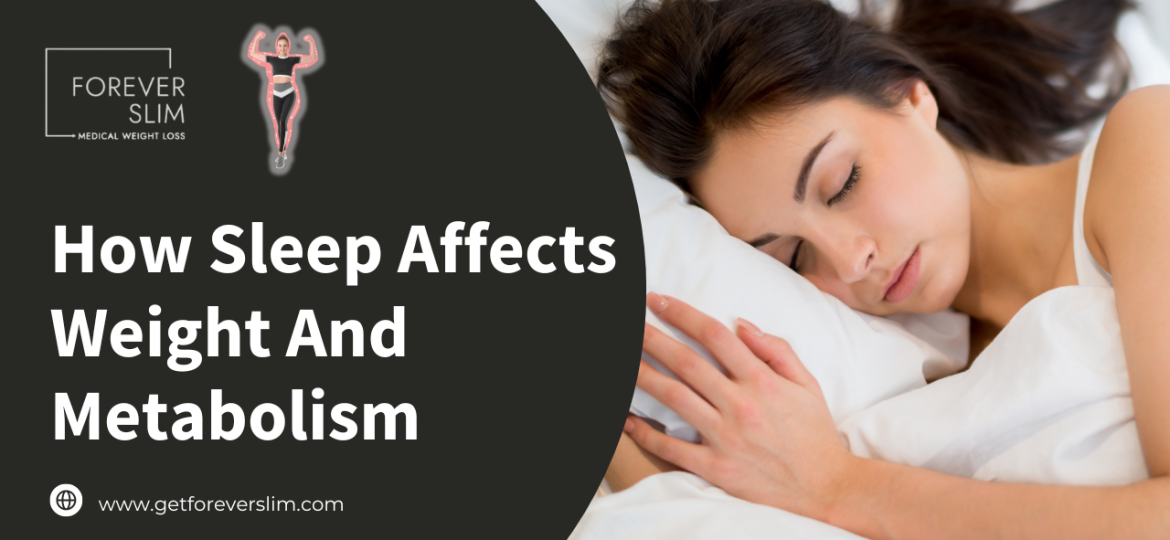
The Connection Between Sleep and Weight

There’s a strong connection between sleep and weight. Getting enough sleep is key to maintaining a healthy weight. There is evidence that shows that people who get too little sleep have a higher risk of weight gain and obesity than people who get enough sleep.
The reason for this link between sleep and weight is still being debated. However, a lot of research has concluded that insufficient sleep can lead to metabolic irregularities, skipping breakfast in the mornings, and increased intake of sweet, salty, fatty, and starchy foods.
Studies suggest that people who sleep for less than 6 hours at night are more likely to be diagnosed with obesity. There’s a need for more studies to fully understand the connection between weight and sleep. Experts encourage quality sleep to maintain a healthy weight.
Metabolism, Appetite, and Sleep
Sleep is essential for both metabolism and appetite. Most people need between 7 and 9 hours of sleep each night. Anything less than that, the body will react badly over time. Getting enough sleep promotes weight loss, while too little sleep hampers your metabolism and appetite, contributing to weight gain.
Too little sleep triggers a spike in cortisol levels, a stress hormone that signals your body to wake up.
Sleep and Obesity
Sleep and obesity are connected by the appetite changes caused by poor sleep. There are two hormones in the body responsible for controlling the appetite. They are leptin and ghrelin.
Leptin tells your body you’re full, while ghrelin tells your brain you’re hungry. Your sleep and wake cycle affects the functioning of these hormones. When you don’t get enough sleep, the leptin levels diminish and the brain sends out signals that you’re hungry even when you don’t need to eat.
On the other hand, the ghrelin hormone levels go up, so you feel hungry. All these promote unhealthy eating habits, which influence weight gain.
Sleep During Weight Loss
Good quality sleep is essential if you want to lose weight. Sleep disruption can affect many biological processes, including weight loss. Sleeping well during your weight loss program promotes metabolism and encourages weight loss.
Altered sleeping patterns during your weight loss program tend to boost your appetite and increase cravings for calorie-dense meals. Many studies also show that changing sleeping time could affect a person’s weight management.
Quality sleep during your weight loss program has a positive impact on your weight while poor sleep increases your risk of having excess fat around your abdominal area, high levels of triglycerides, high blood sugar, and high blood pressure.
Reasons Why Sleep Deprivation Can Lead To Weight Gain

Sleep Deprivation Makes One Less Active
A lack of sleep can cause fatigue, making you less motivated to engage in physical activities that promote weight loss. Being deprived of sleep also makes you more likely to get tired easily during physical activity which contributes to weight gain.
Poor Sleep Increases Appetite
Studies show that sleep-deprived individuals have increased appetite and tend to eat more than those who sleep well. This is mostly due to the action of hormones that signal hunger and fullness.
Sleep Deprivation Is A Risk Factor For Weight Gain
People’s sleep requirements vary, but experts recommend about 7 to 9 hours of sleep. Research has also shown that getting fewer than 7 hours of quality sleep a night is associated with a higher body mass index (BMI) and weight gain.
It’s almost like a vicious cycle in that poor sleep can cause weight gain, and gaining weight decreases your sleep quality.
Poor Sleep Affects Your Judgment
Not having enough sleep affects mental functioning and decision-making. It causes you to make unhealthy food choices. Getting quality sleep may help you make healthier food choices.
The fact that reward centres of the brain are more stimulated by food when you are sleep-deprived also influences your judgment when making food choices.
Sleep Deprivation Impacts Metabolism Negatively
Not getting enough sleep may decrease your metabolism. Your resting metabolic rate (RMR) is the number of calories your body burns at rest. It’s affected by sleep duration. Other factors affecting metabolism besides sleep include age, weight, sex, and muscle mass.
Lack Of Sleep Makes You Feel Hungry Even If You Are Full
Sleep loss influences the secretion of cortisol. If you don’t sleep enough, you may feel hungry despite adequate food intake, which can lead to weight gain.
The imbalance in cortisol levels caused by lack of sleep may increase your body’s need for serotonin, a neurotransmitter linked to mood and appetite. This can increase your food cravings even when you’re not hungry.
Poor Sleep Increases Fat Storage
Not getting enough sleep interferes with the body’s ability to metabolize carbohydrates, leading to high blood sugar levels. Excess blood sugar promotes increased insulin secretion, which can lead to body fat storage and insulin resistance.
Sleep Deprivation Causes Stress
Lack of sleep can lead to heightened stress and even anxiety disorder. The connection concerns how poor sleep affects a part of the brain, acting as negative emotional stimuli. Stress is associated with weight gain.
Tips for Quality Sleep During Weight Loss

Schedule Workouts Strategically
Exercise regularly and schedule your workout routine strategically to help improve your sleep quality. You should exercise no sooner than three hours before your bedtime.
Monitor Your Eating Habits Around Your Sleep Time
You should avoid going to bed when you’re feeling hungry. Only eat a light meal if you’re feeling hungry right before going to bed. Avoid taking caffeinated drinks and alcohol in the evening.
Establish Relaxing Pre-Sleep Rituals
Create a pleasant sleep environment. Ensure it’s dark and quiet. You can also take a warm bath or enjoy a few minutes of reading to prepare for sleep.
The Quality Of Your Mattress Matters
Getting quality night rest is essential for healthy living, so you need to invest in a quality mattress. Wash and change your mattress and sheets frequently to prevent the build-up of bacteria and germs that can impact your ability to get a good night’s sleep.
Practice Proper Sleep Etiquette
If you’re finding it difficult to sleep, stand up after 30 minutes and go to another room to involve yourself in a relaxing activity until you feel sleepy. Don’t nap during the day if you find sleeping difficult at night. Avoid using your smartphone when you’re trying to sleep.
FAQ
Can Lack of Sleep Increase Appetite?
Yes, lack of sleep can increase your appetite. Poor sleep is associated with higher levels of the hormone ghrelin, which increases appetite, and lower levels of leptin.
How is Sleep Related to Physical Activity?
Good sleep leaves you feeling reinvigorated to go about your daily physical activity. Regular physical activity can lead to better overall sleep quality.
How much sleep to lose weight?
If you want to lose weight, you shouldn’t only focus on a healthy diet and exercise programs. You should also ensure that you get quality sleep throughout your weight loss program.
What is the best time to sleep?
The best time to sleep varies for different age populations. Children should go to bed between 8:00 and 9:00 p.m., teens should go to bed between 9:00 and 10:00 p.m., and adults should go to bed between 9:00 and 11:00 p.m.
Going to bed early enough allows you to get enough bed rest. You should ensure you map out time to sleep to get a minimum of 7-8 hours.
Does sleep burn calories?
Yes, sleep burns calories. Each individual burns a different amount of calories during sleep, depending on their personal basal metabolic rate. On average, an individual burns around 50 calories an hour while sleeping.
What is the best position to sleep in?
The best position to sleep in is sleeping on the side or back. Sleeping on your back or side makes it easier to keep your spine supported and stable, which relieves extra pressure on the spine and enables your muscles to relax and recover.
How Forever Slim Gives Medical Weight Loss Consultation
Losing weight entails more than just diet and exercise. Reach out to the weight management experts at Forever Slim for an effective weight loss treatment in Little Elm, TX.
During a medical weight management session at Forever Slim, you’ll meet with a weight management specialist to evaluate your weight loss history and discuss your weight-loss goals. We will develop a personalized weight-loss program to ensure you lose weight.
During your consultation session, we will communicate everything you need to know about how to lose weight.
Take the right step towards achieving a healthy weight by scheduling a consultation with Forever Slim’s weight management specialist.















